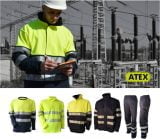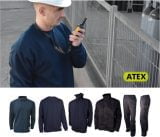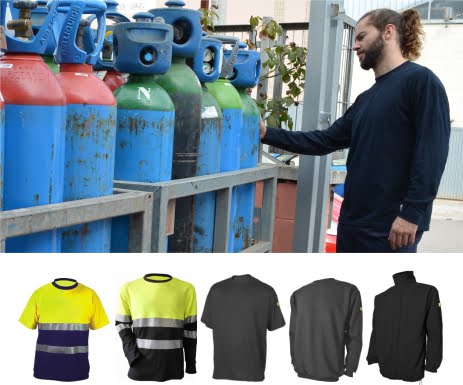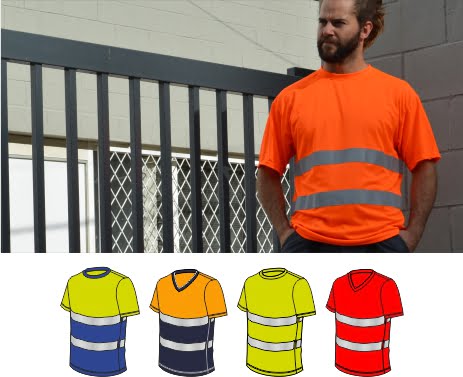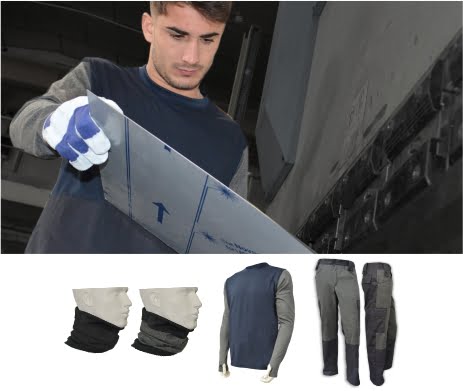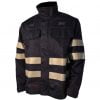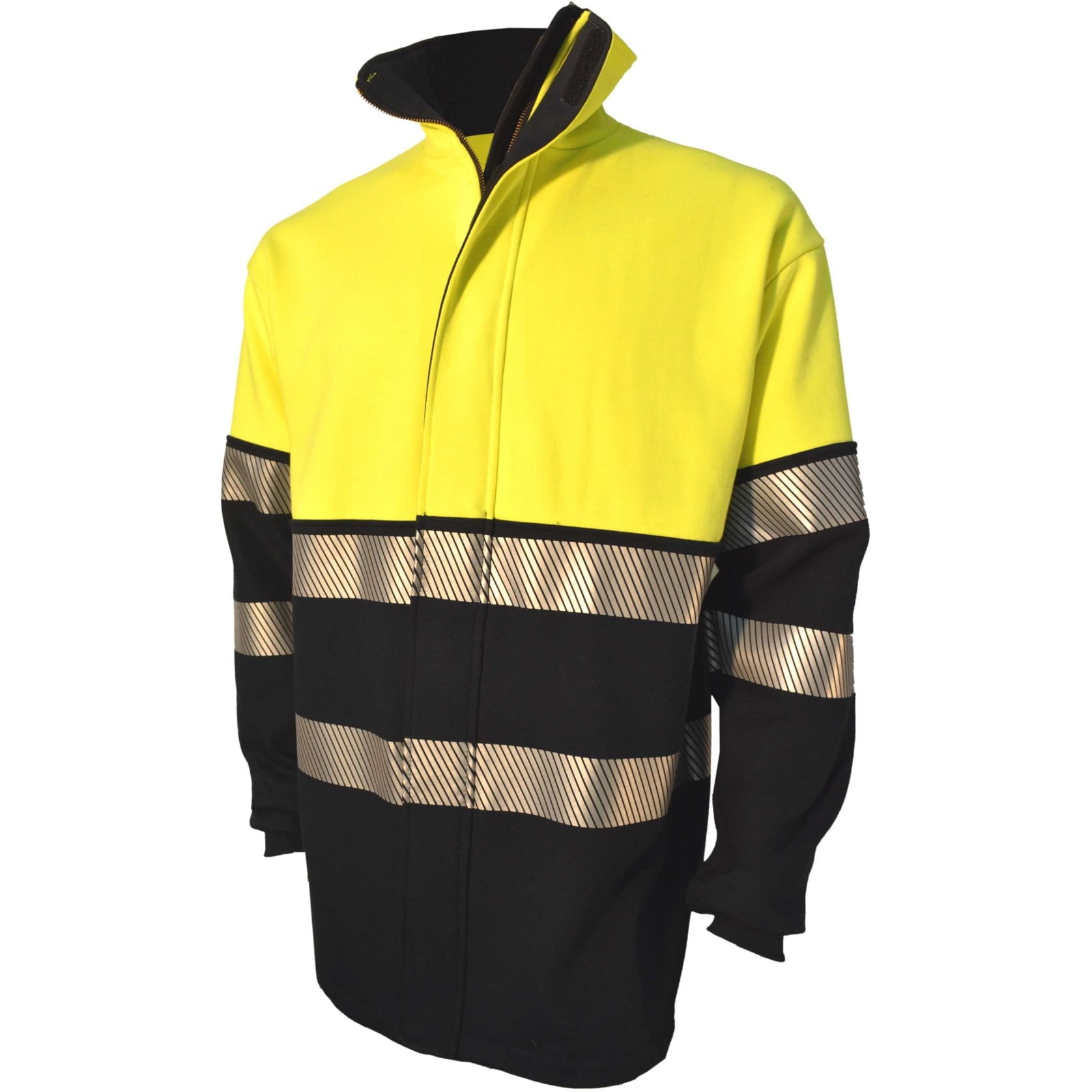TWO TONE FR + AT + EA + HV PLUSHED JACKET HT
From: 99,40€ Taxes not included

COMPOSITION: 50% Cotton, 39% Modacrylic, 10% Viscose, 1% AntistaticTHICKNESS: 380gr / m2
To add a custom logo Click here
DESCRIPTION:
- Two-tone Flame Retardant, Antistatic, Electric Arc and High Visibility long sleeve fleece jacket.
- High neck of the same fabric and elastic cuffs.
- Label with the specific regulations on the bottom, left side.
- Flame retardant zipper covered by a velcro-closed flap.
- Segmented or stitched reflective stripes.
- Band layout M4. No pockets
Garment FIRE RESISTANT, ANTISTATIC, ELECTRIC ARC and HIGH VISIBILITY BICOLOR designed to protect the user against brief contact with heat and / or flames, for the dissipation of electrostatic charges accumulated in the body, protection against the thermal risks of an electric arc, and for situations of low day and night visibility.
Standard EN ISO 13688/13 (general requirements for Protective Clothing): COMPLIES
Category according to EU Regulation 2016/425 (requirements on the design and manufacture of PPE to guarantee the protection of the health and safety of users): CATEGORY III
PERMANENT FIRE-RESISTANT: Standard EN ISO 11612/15 (clothing for protection against heat and flames): A1-A2-B1- C2-F2
| EN ISO 11612/15 heat and flames |
||
| ISO 17493:2000 | Heat resistance to 180º | COMPLIES: No ignition, no hole formation |
| Heat resistance to 260º | COMPLIES: No ignition, no hole formation | |
| A) ISO 15025:2002 | Flame spread | COMPLIES: Without post-combustion; No post-glow, no hole formation, no dripping. |
| B) ISO 9151:1995 | Convective heat | COMPLIES: Level B1 |
| C) UNE-EN 366/94 | Radiant heat | COMPLIES: Level C2 |
| F) ISO 12127:1996 | Contact heat (250º) | COMPLIES: Nivel F2 |
| EN ISO 13938-1 | Burst resistance | COMPLIES 295,5 kPa |
PERMANENT ANTISTATICS: Standard EN 1149-5 / 18 (protective clothing with electrostatic properties): COMPLIES
| EN 1149-5:2018 ANTISTATIC | Value specified by norm | Value obtained from the fabric |
| ELECTRICAL FIELD INTENSITY(S) | >0.2 | 1,99 |
| SEMI-DISSIPATION TIME (t50) | <4 sec | —— |
ELECTRIC ARC: Standard IEC 61482 2: 2018 (protective clothing against the thermal risks of an electric arc): 4 kV – CLASS APC1
| Norm IEC 61482-1-2/18 Protective clothing against thermal risks of an electric arc (4 kA) | ||
| Test | Minimum requirements | Values obtained from knitting |
| Burn time | < 5 sec. | COMPLIES t<2 sec Class 1 |
| No hole formation | No hole formation | COMPLIES Class 1 |
| No fusion at the back | No fusion at the back | COMPLIES Class 1 |
| No drip | No drip | COMPLIES Class 1 |
| Correct STOLL per sample | Correct STOLL per sample | COMPLIES Class 1 |
| Operational closure elements | Operational closure elements | COMPLIES Class 1 |
| Bow classification | Minimum value ATPV = 4 cal/cm2 | ATPV = 16,2 cal/cm2 Heat attenuation factor HAF=86,2% |
HIGH VISIBILITY: Standard EN ISO 20471: 2013 (High Visibility protective clothing): CLASS 1
The maximum exponent nowadays, with regard to the passive safety of the user on public roads, is determined by the use of high visibility garments that guarantee the signaling of the user both day and night. In this sense, current community legislation is included in the European Standard EN ISO 20471, which establishes the characteristics that visual signaling garments must meet.
| UNE-EN ISO 20471 NORM : High Visibility | ||
| Fluor background color surface | Retro reflective material surface | High Visibility Class |
| > 0.14 m2 | > 0.10 m2 | Class 1 |
Sizing
At Multinormwear we adapt to your size needs with our multinorm garments.
We have a very wide size in our range of products:
- From the usual sizes that go from the XS to 3XL
- Range of extra-large sizes, ranging from 4XL to 7XL
DETERMINE YOUR SIZE:
This table will help you determine the size you are looking for.
Measure below the armpits, the most prominent part of your contour (chest, waist or hips).
Keep the tape measure horizontal and, in the table you will find the correspondence in size.

(Tolerance margin of + – 2 cm)
Reflective Bands
1) SEWED REFLECTIVE STRIP:
Fire retardant retroreflective material
The reflective tape we use is manufactured following strict quality control procedures and has been certified in accordance with the performance levels required by the standards. EN 471: 2003 (High visibility signaling clothing), ANSI / ISEA 107-2004 (High Visibility Safety Clothing) and EN 469: 2005 (Protective clothing for firefighters).
The tape is made up of different layers that allow you to combine a high level of reflectivity with good washing resistance, low temperature performance, abrasion resistance (according to the EN-471 standard) and limited flame spread (according to the definition contained in the EN-469 standard). The light reflective layer of this tape is composed of partially aluminized mbeads ™ and the substrate material is fire resistant polycotton.
Owns a excellent fastness to washing , has been tested to support 50 cycles washing at 60ºC and 5 dry cleaning cycles. It also features a very good resistance to heat and fire .
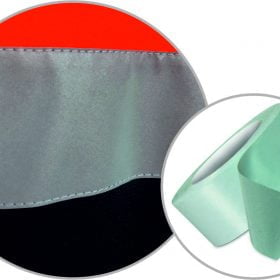
2) DISCONTINUOUS THERMAL FIXED BAND:
Reflective Material – Flame Resistant Band
This reflective material is designed for use in protective clothing that requires flame resistance. Used properly, this reflective material helps to improve user visibility in night conditions or low visibility when illuminated through the headlights of a vehicle, returning the light to the original source and reaching the driver’s eye.
It is composed of retroreflective lenses attached to an adhesive that is activated by heat. The band is 50.8 mm (2 inches) wide.
It is certified under the updated versions of EN ISO 20471 for High Visibility garments.
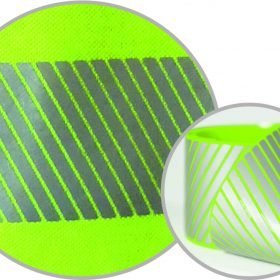
Recommendations
Instructions for use:
This PPE has been conceived to protect the areas of the user’s body covered by it, dissipating electrostatic charges from the body and as a high visibility garment.
· Ground connection: The person wearing electrostatically dissipative protective clothing must be grounded, either by electrostatically dissipative footwear or by any other suitable means. The resistance between the person and the earth must be less than 108Ω
It should not be removed , or remove in the presence of flammable or explosive atmospheres, or when handling flammable or explosive substances.
For the protection of the whole body, protective clothing should be worn closed and as close to the body as possible, and with other suitable protective equipment. Clothing must be grounded through direct contact with the wearer’s body or through a direct ground connection.
The properties of heat and flame resistance, electrostatic dissipation, protection against the thermal risks of an electric arc, and the high visibility properties of this protective clothing can be affected by wear and tear, washing and possible contamination.
· The user should not put on any other garment unless it has the same properties of electrostatic dissipation, heat resistance, protection against electric arc, and high visibility as these.
Electrostatic dissipative protective clothing must permanently cover all non-dissipative materials during normal use (including bending and movement)
Recommendations against misuse:
· This PPE should never be used against risks other than those described above.
· Poor maintenance of the garments can modify their performance.
· Dirty laundry can lead to reduced protection.
· The tears must not be repaired by the user.
· Limits of use: This protective clothing must NOT be used in oxygen-rich atmospheres without the prior approval of the technician responsible for safety. This garment does NOT offer protection against electrical stress.
Washing recommendations:
![]()
MAX. 25 washes
· Washing at a maximum temperature of 40ºC.
· Bleaching is not allowed.
· The use of softening agents during washing is not allowed.
· Iron at 2 points (max. 150ºC).
· Dry cleaning is not allowed.
· Low temperature tumble drying is not allowed.
Storage: Store the garment avoiding unnecessary sun exposure and in dry places, protected from any aggressive agent.
The fire retardant, antistatic and high visibility properties of this garment are permanent, so the useful life of the PPE will be a direct function of use and care, so it can be used without prior limit as long as no evidence of deterioration is observed. Despite this, its replacement is recommended after a period of one year of use.




